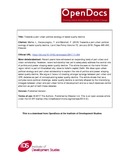Towards a Peri-urban Political Ecology of Water Quality Decline
| dc.contributor.author | Mehta, Lyla | |
| dc.contributor.author | Karpouzoglou, Timothy | |
| dc.contributor.author | Marshall, Fiona | |
| dc.date.accessioned | 2017-11-30T12:04:19Z | |
| dc.date.available | 2017-11-30T12:04:19Z | |
| dc.date.issued | 2018-01 | |
| dc.identifier.citation | Mehta, L., Karpouzoglou, T. and Marshall, F. (2018) Towards a peri-urban political ecology of water quality decline, Land Use Policy Volume 70, January 2018, Pages 485-493, Elsevier | en |
| dc.identifier.uri | https://opendocs.ids.ac.uk/opendocs/handle/20.500.12413/13397 | |
| dc.description.abstract | Recent years have witnessed an expanding body of peri-urban and urban scholarship. However, recent scholarship has yet to adequately address the central role of politics and power shaping water quality decline. The article focuses on the trans-Hindon region which is part of Ghaziabad city, close to India’s capital, Delhi. We draw upon urban political ecology and peri-urban scholarship to explain the role of politics and power shaping water quality decline. We argue in favour of creating stronger synergy between peri-urban and UPE debates as part of conceptualizing water quality decline. The article shows that as a complex socio-political challenge, water quality decline is centrally shaped by the intensifying linkages between urban and peri-urban forms of development and as a result deserves central attention as part of both these debates. | en |
| dc.language.iso | en | en |
| dc.publisher | Elsevier Ltd | en |
| dc.rights | This article is available under the terms of the Creative Commons Attribution License (CC BY). You may copy and distribute the article, create extracts, abstracts and new works from the article, alter and revise the article, text or data mine the article and otherwise reuse the article commercially (including reuse and/or resale of the article) without permission from Elsevier. You must give appropriate credit to the original work, together with a link to the formal publication through the relevant DOI and a link to the Creative Commons user license above. You must indicate if any changes are made but not in any way that suggests the licensor endorses you or your use of the work. | en |
| dc.rights.uri | http://creativecommons.org/licenses/by/4.0/ | en |
| dc.subject | Environment | en |
| dc.subject | Water | en |
| dc.title | Towards a Peri-urban Political Ecology of Water Quality Decline | en |
| dc.type | Article | en |
| dc.rights.holder | © 2017 The Authors | en |
| dc.identifier.externaluri | http://www.sciencedirect.com/science/article/pii/S0264837717307822 | en |
| dc.identifier.team | Resource Politics | en |
| dc.identifier.doi | https://doi.org/10.1016/j.landusepol.2017.11.004 | |
| dcterms.dateAccepted | 2017-11-02 | |
| rioxxterms.funder | Default funder | en |
| rioxxterms.identifier.project | Default project | en |
| rioxxterms.version | NA | en |
| rioxxterms.versionofrecord | https://doi.org/10.1016/j.landusepol.2017.11.004 | en |
| rioxxterms.funder.project | 9ce4e4dc-26e9-4d78-96e9-15e4dcac0642 | en |
Files in this item
This item appears in the following Collection(s)
-
IDS Research [1671]
Except where otherwise noted, this item's license is described as This article is available under the terms of the Creative Commons Attribution License (CC BY).
You may copy and distribute the article, create extracts, abstracts and new works from the article, alter and revise the article, text or data mine the article and otherwise reuse the article commercially (including reuse and/or resale of the article) without permission from Elsevier. You must give appropriate credit to the original work, together with a link to the formal publication through the relevant DOI and a link to the Creative Commons user license above. You must indicate if any changes are made but not in any way that suggests the licensor endorses you or your use of the work.


